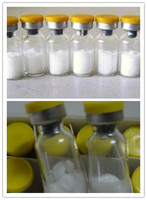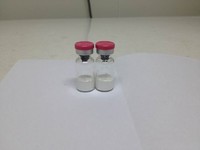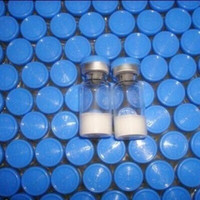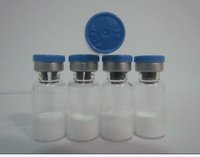Follistatin-344 1mg/vial
Product Quick Detail
- Minimum Order
- 10
- Place Of Origin
- China (Mainland)
- Packaging
- As your requirement
- Delivery
- 3~7 Days
Specifications
Follistatin-344 1mg/vial
Myostatin Blockers Follistatin 344 for Bodybuilding
Function:Hormones and Regulation of Endocrine Function of Drug
Grade Standard:Medicine Grade
Name:Follistatin 344
Appearance:Sterile Filtered White Lyophilized (Freeze-Dried)
Purity(by HPLC):>99.00%~99.90%
Total Impurities(by HPLC):1.00%~0.05%
Single Impurity(by HPLC):<0.50%~0.08%
Storage Conditions:Aviod Shunshine and Keeping Stoppered
Export Markets:Global
Trademark:SMQ
Packing:as Your Requirement
Standard:USP
Origin:China(Mainland)
Production Capacity:10000vials/months
Follistatin is fascinating protein that can increase muscle mass beyond natural potential by suppressing myostatin. Scientists first identified follistatin while examining porcine (re: pig)
follicular fluid in the ovaries. [1]
Follistatin is naturally found in the skeletal muscle of almost all mammals with advanced or developed characteristics, such as humans, rodents, and cows. Follistatin is high in the non-essential
amino acid cystine but unlike most proteins discussed in the fitness world, follistatin has carbohydrates attached to it. [2]
Follistatin, specifically Follistatin 344 (FS344), quickly gained popularity in the bodybuilding community as a potential supplement to rapidly increase lean tissue mass. Another protein,
follistatin-related gene (FLRG) acts on similar pathways as FS344 regarding its muscle building properties. Increased lean tissue mass could give a bodybuilder an advantage in a competitive setting
and be the differentiating factor between first and second place.
Follistatin and Muscle Growth
Follistatin works by binding to and inhibiting transforming growth factor-β (TGF-β) peptides such as myostatin which is responsible for regulating and limiting muscle growth. [3] It's also worth
pointing out that myostatin may have a regulatory role in skeletal muscle fibrosis; too much myostatin can impair tissue function and cause chronic disease in vital organs, tissues, and bone
marrow. [4] [5]
In additional to suppressing the degenerative properties of myostatin, follistatin also suppresses the pituitary gland synthesis and secretion of follicle-stimulating hormone (FSH). [1] High FSH
levels in men may indicate that testicles are not functioning correctly; this condition limits muscle growth, recovery, and normal hormonal function. [6] However, FSH levels that are too low can
also negatively impact health and reproductive capabilities.
- Contact: Jeana Lee










